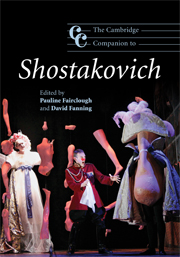Book contents
- Frontmatter
- Introduction
- PART I Instrumental works
- 1 Personal integrity and public service: the voice of the symphonist
- 2 The string quartets: in dialogue with form and tradition
- 3 Paths to the First Symphony
- 4 Shostakovich's Second Piano Sonata: a composition recital in three styles
- 5 ‘I took a simple little theme and developed it’: Shostakovich's string concertos and sonatas
- PART II Music for stage and screen
- PART III Vocal and choral works
- PART IV Performance, theory, reception
- Notes
- Select bibliography
- Index
2 - The string quartets: in dialogue with form and tradition
from PART I - Instrumental works
Published online by Cambridge University Press: 28 September 2011
- Frontmatter
- Introduction
- PART I Instrumental works
- 1 Personal integrity and public service: the voice of the symphonist
- 2 The string quartets: in dialogue with form and tradition
- 3 Paths to the First Symphony
- 4 Shostakovich's Second Piano Sonata: a composition recital in three styles
- 5 ‘I took a simple little theme and developed it’: Shostakovich's string concertos and sonatas
- PART II Music for stage and screen
- PART III Vocal and choral works
- PART IV Performance, theory, reception
- Notes
- Select bibliography
- Index
Summary
Shostakovich's magnificent cycle of string quartets has received an exceptionally diverse reception. Soviet commentaries are filled with rhetoric describing the quartets as chapters in the life of the ‘positive hero’ of Socialist Realist narratives, and writers in both Russia and the West have heard them as vivid narratives, whether confessional autobiography or chronicles of the composer's times. The quartets have also been interpreted as examining major ethical and philosophical issues, including war, death, love, the conflict of forces of good and evil, the nature of subjectivity, the power of creativity and the place of the individual – in particular the artist – in society. This chapter will examine some of the musical features – especially Shostakovich's dialogues with musical traditions both Russian and Western – that have provoked such vivid responses.
Among the most notable of these dialogues is with traditional forms. Non-resolving recapitulations and withholding of harmonic closure are characteristic of Shostakovich's quartets, creating a rhetoric of disintegration, as opposed to the fulfilment characteristic of eighteenth-century formal archetypes. Such strategies are, of course, far from unique to Shostakovich or, within his oeuvre, to his quartets. But they appear here in exceptionally salient and potent guises.
Information
- Type
- Chapter
- Information
- The Cambridge Companion to Shostakovich , pp. 38 - 69Publisher: Cambridge University PressPrint publication year: 2008
Accessibility standard: Unknown
Why this information is here
This section outlines the accessibility features of this content - including support for screen readers, full keyboard navigation and high-contrast display options. This may not be relevant for you.Accessibility Information
- 3
- Cited by
